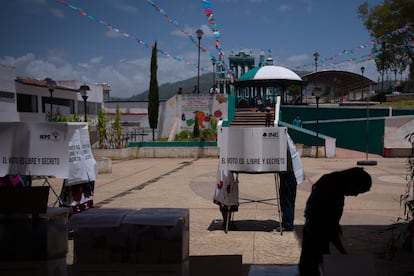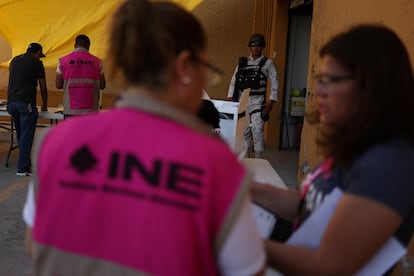Mexicans vote for their first female president in history, amidst a country mired in violence
More than 98 million voters will be able to decide whether to continue the path laid by President López Obrador. Alternatively, they could throw their support to the conservative opposition


More than 98 million voters have been called to the polls this Sunday in Mexico. They will decide whether to continue with current policies, or to change the path going forward. The frontrunner is Claudia Sheinbaum, 61, the successor to President Andrés Manuel López Obrador (AMLO). Long the favorite in all the polls, the candidate for the ruling MORENA party has a clear advantage to become the first woman to occupy the presidency of Mexico. The other major candidate — Xóchitl Gálvez, a former senator — represents a big tent, multiparty opposition coalition, although public opinion surveys insist that she stands no chance.
For those who don’t want to pick from the large parties, there’s a third option, although it has few possibilities of succeeding. The Citizens’ Movement has refused to join the opposition coalition: it will try to win over the youth vote on its own. In recent days, the party has been proposing legislation in favor of marijuana consumption and abortion — two of their hallmark issues — although both practices have already been decriminalized by the Supreme Court.
Over this past six-year period — the length of a presidential term — Mexico has achieved a notable reduction in poverty, although it still affects 36% of a population of 126 million inhabitants in moderate or extreme ways. The country’s crime statistics, however, haven’t managed to decrease enough to leave any space for hope. There has been an average of 30,000 murders per year since 2018, which makes López Obrador’s administration the most violent since records have been kept. The 2024 elections have been an example of this, with around 30 candidates murdered since last June, when the campaign informally began. Poverty and violence have been the two key issues in the presidential campaign, which officially began on March 1.
The PRI-PRD-PAN opposition coalition has harshly attacked the levels of insecurity in the country, employing the slogan “For a Mexico without fear.” However, when it comes to poverty, the bloc has tried to convince the electorate that, should they come to power, they won’t eliminate the many social support programs that President López Obrador has offered to disadvantaged families. Currently, about 70% of Mexican households benefit from some of these, whether they be educational scholarships or old age pensions. Senator Gálvez — who grew up in an impoverished town — has repeated that she will support the poor if she’s elected. She says that she understands their needs, even though she’s now an engineer, businesswoman and politician.
The favorite — Sheinbaum — doesn’t have the majority support of the poor. The movement that she belongs to, however, does. MORENA — a party that she participated in founding — brought López Obrador to the presidency with a landslide and keeps him on a political pedestal worthy of a secular saint. In his sixth and final year in office, his approval rating hovers around 60%. This strength is what has propelled his candidate, who has actively and passively promised to “safeguard his legacy,” now that he will retire to his ranch when he hands over the presidential sash on October 1.

The continuity that Sheinbaum offers guarantees her a huge voter base. Still, there are those who fear that the numerous adversaries that the president has gained during his mandate will reduce support across other socioeconomic sectors that, in principle, would seem easy to secure for a middle-class candidate. Sheinbaum holds a doctorate in Physics and, before politics, she was a student activist and had a career in academia.
The middle classes turned their backs on López Obrador due to his continuous attacks on scientists, journalists, intellectuals, artists, feminists, and everyone else who made it on his long list of adversaries. Hence, the president’s motto — “For the good of all, the poor first” — works in favor of Sheinbaum. Still, it remains to be seen how much ground she can gain among Mexicans from her own class.
There are those who are sure that should Sheinbaum — the former head of the government of Mexico City — become president, she will improve or alter some of AMLO’s policies that she has so far been silent about. And there’s no shortage of those who think that she’ll actually get even more votes than her predecessor.
Whether there have been improvements over the last six years or not (the answer depends on who you ask), Mexico still has major pending issues in basic areas. In the education sector, for instance, a major reform took place during this administration and is just beginning to be introduced into the classrooms, with total uncertainty. And in healthcare, the public health system has multiple shortages of human resources and vital medications.
It’s the economy — one of the areas that citizens are heavily focused on — that has provided the most joy to the government, offering the largest amount of electoral ammunition to Sheinbaum. Since AMLO took office in 2018, the minimum wage has been raised to historic levels, foreign investment and exports have broken records, while remittances from migrants — which oftentimes support entire towns — have increased dramatically. The Mexican peso is strong — almost unparalleled among countries that have a similar GDP — while there’s also hope that there will be even more jobs, given the fact that more American companies are relocating to Mexico. And, as has occurred with social programs and social assistance, not even the opposition dared to denigrate the economic achievements of the ruling party throughout the campaign.
These elections — the largest in Mexican history — will also decide the new composition of the two chambers of Congress, the governorships of nine states (including the capital, which is administered with similar autonomy), several state legislatures and all the mayoralties across the country. All in all, more than 20,000 elected offices are up for grabs. Citizens will go to fill them at the ballot boxes… wherever they’re not burned or stolen, at least. Incidents tend to happen. 98 international observers from the Organization of American States (OAS) and other teams at the request of the parties will review the electoral process. While Mexico has a solid democratic process, there are some red dots on the map of the territory, due to either criminal violence or other resistance to the elections. Voters controlled by local bosses, or deceptive unions that provide thousands of votes from certain labor sectors to favored candidates — who brazenly acknowledge it — are also common.
One of the great unknowns of this election has to do with the Institutional Revolutionary Party (PRI). The party that has defined Mexico for decades — ruling uninterruptedly from 1929 until 2000, and again from 2012 until 2018 — has been experiencing near-death setbacks for years. It’s the party that currently faces the most rejection from citizens at the polls. State by state, the PRI has been losing its territorial strength, with many senior leaders having abandoned the party, or having been expelled. The PRI is bleeding. and everything indicates that these elections will make it irrelevant in the country’s political future. Of course, the party’s bad reputation has been one of the opposition candidate’s major burdens on the campaign trail.
The second surprise could come from Mexico City. Governed for 27 years by the left, this time, the conservatives are hot on their heels. This shift was already demonstrated during the 2021 midterm elections, when the right-wing National Action Party (PAN) and its allies gained a majority in the Congress of Mexico City. This result, however, won’t necessarily be repeated: the 2024 elections are much more complex and the weight of the presidential vote will play in favor of the party that triumphs. If Sheinbaum wins, it’s likely that part of her success will also be reflected in Mexico City. But within MORENA, operatives haven’t stopped showing signs of concern about their strength in the capital.
Importantly, the June 2 elections don’t coincide with the end of the current presidential term. López Obrador has promised to exhaust the legislature, sending both chambers a package of measures that require a constitutional reform. To do this, however, he needs these legislative elections to yield a two-thirds majority — something that’s not so simple. On top of that, the incoming legislators will only have the month of September left to legislate before AMLO’s time in office concludes on October 1. The new government must take charge of everything that has been left pending, to either improve it, modify it, or destroy it. This will all depend on who wins. And that’s exactly what Mexicans will decide in a few hours.
Sign up for our weekly newsletter to get more English-language news coverage from EL PAÍS USA Edition
Tu suscripción se está usando en otro dispositivo
¿Quieres añadir otro usuario a tu suscripción?
Si continúas leyendo en este dispositivo, no se podrá leer en el otro.
FlechaTu suscripción se está usando en otro dispositivo y solo puedes acceder a EL PAÍS desde un dispositivo a la vez.
Si quieres compartir tu cuenta, cambia tu suscripción a la modalidad Premium, así podrás añadir otro usuario. Cada uno accederá con su propia cuenta de email, lo que os permitirá personalizar vuestra experiencia en EL PAÍS.
¿Tienes una suscripción de empresa? Accede aquí para contratar más cuentas.
En el caso de no saber quién está usando tu cuenta, te recomendamos cambiar tu contraseña aquí.
Si decides continuar compartiendo tu cuenta, este mensaje se mostrará en tu dispositivo y en el de la otra persona que está usando tu cuenta de forma indefinida, afectando a tu experiencia de lectura. Puedes consultar aquí los términos y condiciones de la suscripción digital.








































